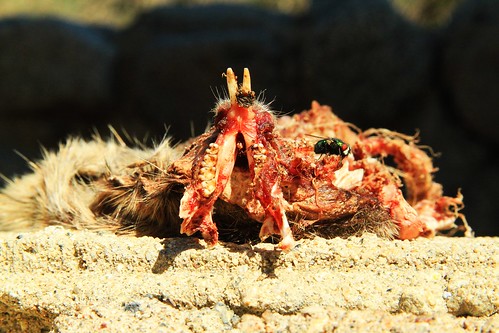Liberal or conservative? Your reaction to one disgusting image accurately predicts your politics.
 |
www.flickr.com
"A single disgusting image is sufficient to predict a subject's political orientation,"
says one researcher. "I haven't seen such clean predictive results in any other
experiments in our lab or others."
|
According to this and other research, nurture appears to play a role, but it seems that nature is the controlling factor. To paraphrase Lady Gaga, "we're born this way." As to why some people are born liberal or conservative, there is research to do. Does being conservative or liberal convey an adaptive evolutionary advantage for the individual? If that were the case, I assume we'd all be one or the other.
Is a society with a mix of conservative or liberal orientations convey an evolutionary advantage? From my untutored point of view, I would say, definitely, yes. Having members of a group such as a tribe that see and advocate new approaches to daily life, such as adopting agriculture or settling into a fixed location, leads to "progress." On the other hand, having members of the group who argue for traditional ways and means counterbalances a group's likelihood of charging off into an untried experiment that could lead to a disaster.
So perhaps, achieving a conservative - liberal balance is the most likely way we as a species have been able to survive some millions of years achieving amazing progress without going off the deep end. The implication is that for us to survive as a species, we must find practical ways to balance views that appear to be genetically programmed into each of us. And for that to happen, we have to get past the "my way or the highway" mentality of either liberal or conservative extremists.
Something to think about whether you write pre-historical fiction set thousands of years in the past or sci-fi set thousands of years in the future.
Here's the report:
The way a person's brain responds to a single disgusting image is enough to reliably predict whether he or she identifies politically as liberal or conservative. As we approach Election Day, the researchers say that the findings reported in the Cell Press journal Current Biology on October 30 come as a reminder of something we all know but probably don't always do: "Think, don't just react."
 |
| Recommended reading The 101 Most Influential People Who Never Lived: How Characters of Fiction, Myth, Legends, Television, and Movies Have Shaped Our Society 3 1/2 Stars on Goodreads |
To find out just how fundamental those connections are, Montague and his colleagues asked whether functional magnetic resonance images (fMRI) of the brain taken as people passively looked at a series of disgusting, pleasant, and neutral images was enough to give away their political leanings, as measured on a standardized test. (The Wilson Patterson inventory produces a score from 0 to 1, from extremely liberal to extremely conservative.)
The researchers applied a machine-learning method to all of those pictures together with the test scores in search of a predictable relationship between the two. And, indeed, they found it. Disgusting images, and the mutilated body of an animal especially, generated neural responses that were highly predictive of political orientation. That was true even though the neural predictors didn't necessarily agree with participants' conscious rating of those disturbing pictures.
It's not clear from the study exactly how or why liberal versus conservative brains differ from each other, Montague explains, only that they do. In fact, the researchers were especially surprised by the strength of the response.
"A single disgusting image was sufficient to predict each subject's political orientation," he says. "I haven't seen such clean predictive results in any other functional imaging experiments in our lab or others."
Perhaps the new findings can help us find a way to a less-polarized political future. People really do differ from one another in fundamental ways, but we also have the unique ability to make up our own minds and to change them.
"The results do not provide a simple bromide, but they do suggest that important foundational parts of political attitudes ride on top of pre-established neural responses that may have served to defend our forebears against environmental threats," Montague says. "In the same sense that height is highly genetically specified, it's also true that it's not predetermined by genetics; nutrition, sleep, starvation, dramatic physical injury, and so on can serve to change one's ultimate height. However, tall people have tall children, and this is a kind of starting point."
"In the same vein, if we can begin to see that some 'knee-jerk' reactions to political issues may be simply that -- reactions -- then we might take the temperature down a bit in the current boiler of political discourse."
Related posts:
- Are We Hard-wired to Believe in Immortality? Science Suggests Yes
- Are we hard-wired to take risks?
- The Brain Function Abnormalities of Gambling Addicts
- Brain structure predicts risky behavior
- How Visiting High Crime Neighborhood Effects People
- Inside the Minds of Murderers
- People Predisposed to Hate or Love
- Sudden Wealth makes People Conservative and Less Egalitarian
- Will a Child Grow Out of It? or Not?
- Yes, People Can Learn Compassion
* * * * *
Story Source: Materials provided by Cell Press. Ahn et al. Nonpolitical images evoke neural predictors of political ideology. Current Biology, October 2014
Comments
Post a Comment